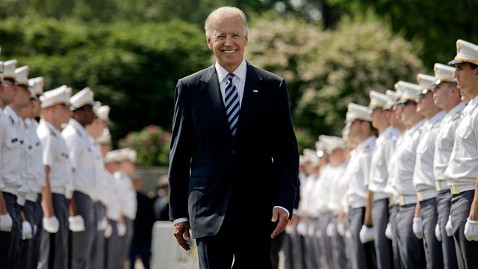At West Point Commencement, Joe Biden Focuses on Future Challenges

Lee Celano/Getty Images
Vice President Joe Biden told a graduating class of army cadets today that their entrance into the service had come at time of rapid change for the nation's military.
Delivering the commencement address to roughly a thousand students of the U.S. Military Academy at West Point, N.Y., the vice president said the 9/11 generation of service members had taken on "responsibilities far beyond the base or the battlefield."
"Young men and women steeped in military doctrine have had to master the intricacies of tribal politics, deal with issues ranging from electricity to unemployment, currency exchange to taxation," he said, "You are a remarkable, remarkable, remarkable group."
Biden thanked the newly-commissioned second lieutenants and their families for serving their country "in an era where the sacrifice of our military had never been greater."
Calling the fight against terrorism "perhaps the most daunting in this nation's history," Biden affirmed the U.S. planned to maintain a substantial presence in the Middle East for the indefinite future. But, he said, the end of the Iraq war and the scheduled 2014 drawdown in Afghanistan would allow the country to prepare for new endeavors.
"Winding down these long wars will enable us to replace and rebalance our foreign policy, take on the full range of challenges that will shape the 21 st century," he said.
Biden acknowledged two former graduates of the war college, Joint Chiefs Chairman Gen. Martin Dempsey and Army Chief of Staff Gen. Ray Odierno for formulating the strategies to resolving the conflicts.
Touting President Barack Obama's foreign policy record, the vice president looked to Asia and North Africa as examples of future American military and diplomatic strategy.
"We learned during the Libya campaign, where we saved thousands of innocents and help topple a murderous dictator, that there's almost nothing, nothing we cannot accomplish when NATO and our partners act decisively. And when we actually share the burden of the responsibility."
Recognizing a shifting U.S. presence in the Pacific region, the vice president said the country's growing interconnection with China was critical to shaping the coming years.
"This obviously doesn't mean we'll always see eye-to-eye, including on issues like human rights, nor does it mean we will not compete with each other economically," he said. "Americans welcome this competition, which drives us to do better and better, because there's no doubt that America can compete, and America will win whenever and wherever the playing field is level."
Looking further to cyber security and even outer space, Biden said the academy on the Hudson River had prepared its students to "face these challenges, some of which we are yet to even contemplate let alone encounter."
This was Biden's first commencement address to the West Point institution. After his remarks, the 2012 class presented him with a gleaming ceremonial saber; he said he would "display it proudly." Beau Biden, a Major in the Delaware National Guard, watched his father and the ceremonies from the audience.
Today's address largely followed the themes of President Obama's own remarks at the U.S. Air Force Academy in Colorado on Wednesday.
There, the Commander in Chief told cadets they were graduating into a "new era of American leadership" abroad. Obama said this year's crop of graduates were the first class to enter a world without an Iraq war or Osama bin Laden.
On Tuesday Defense Secretary Leon Panetta will address this year's class of naval cadets in Annapolis, Md.
ABC's Alex Marino contributed to this report.